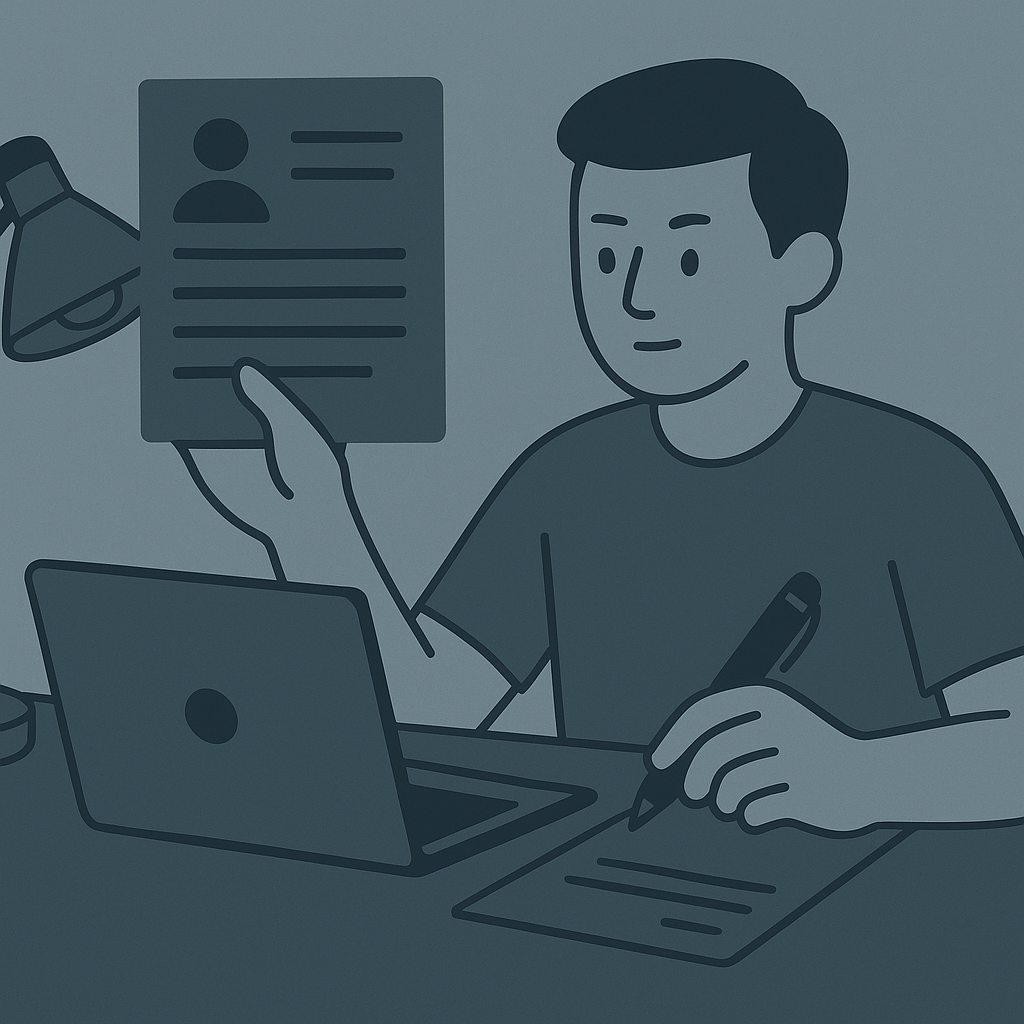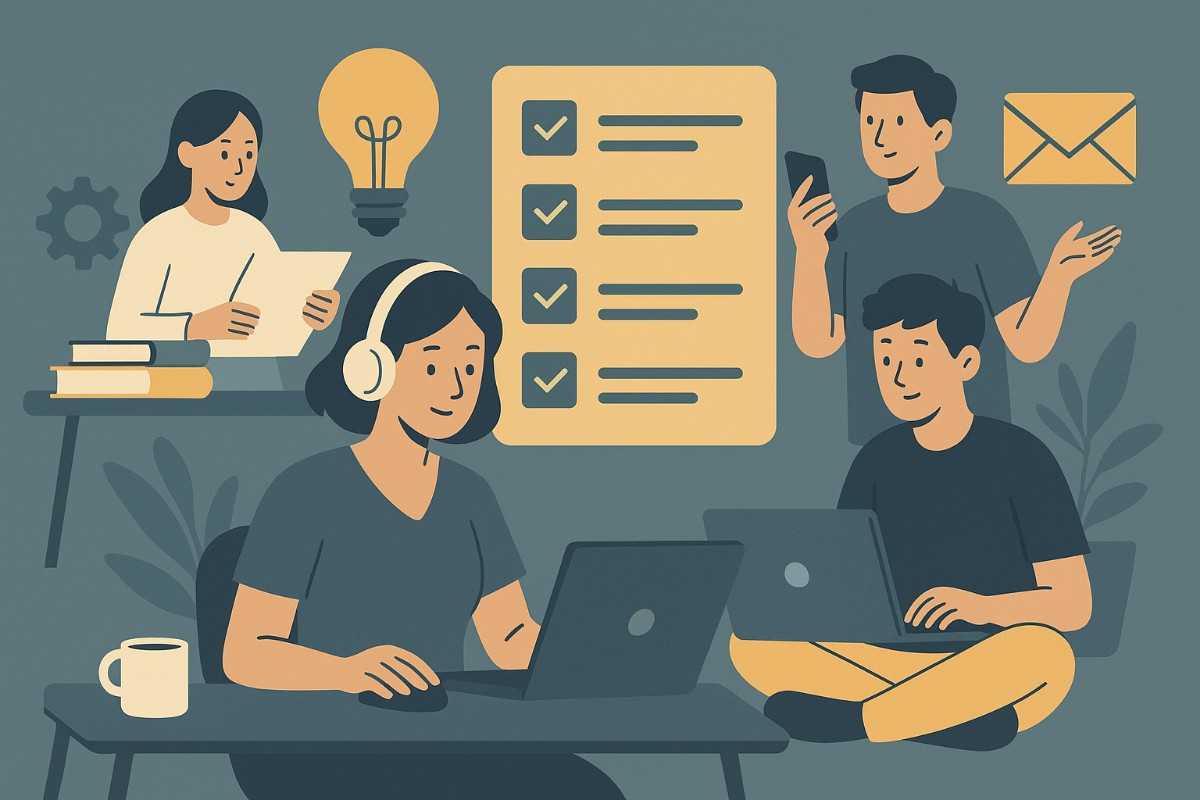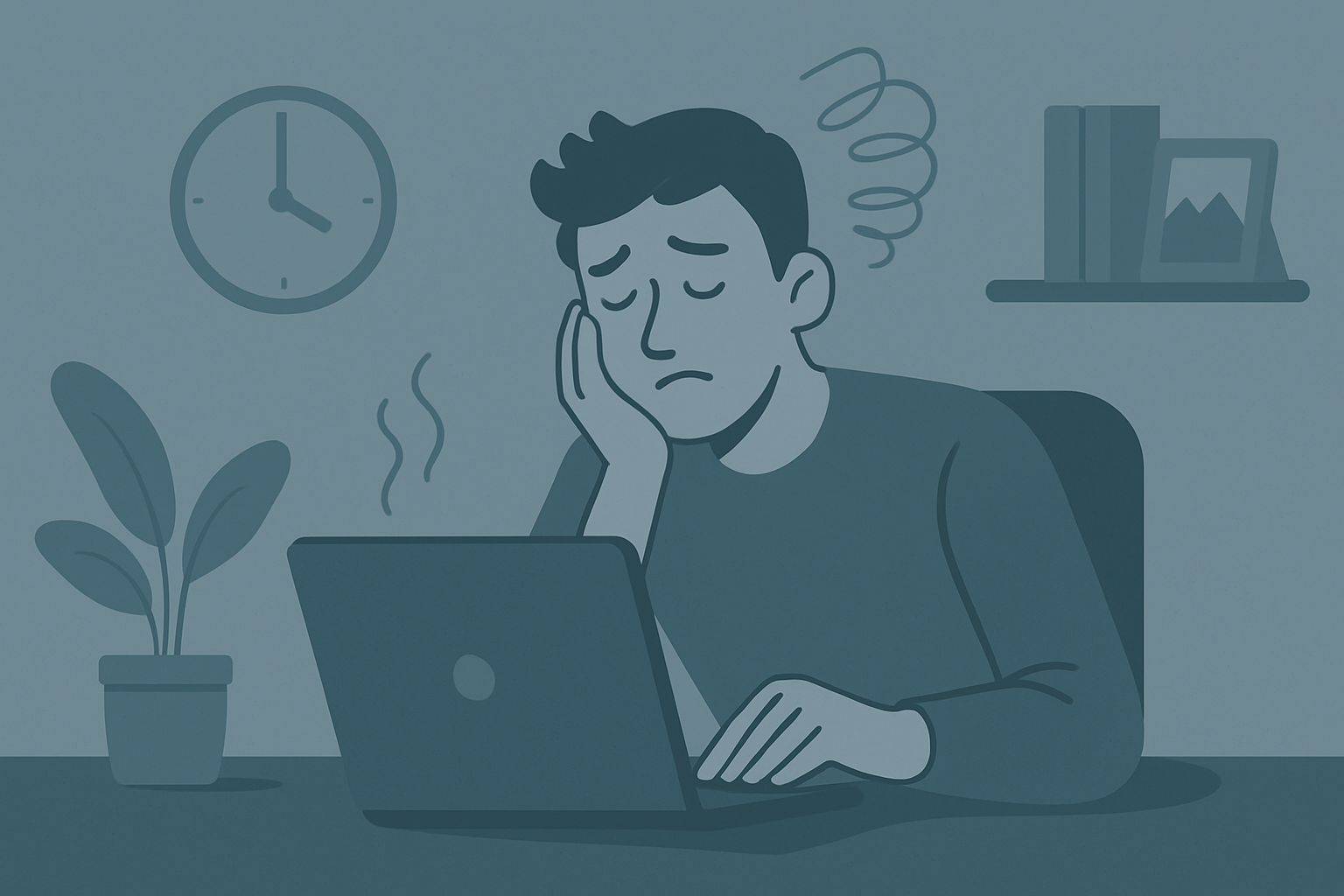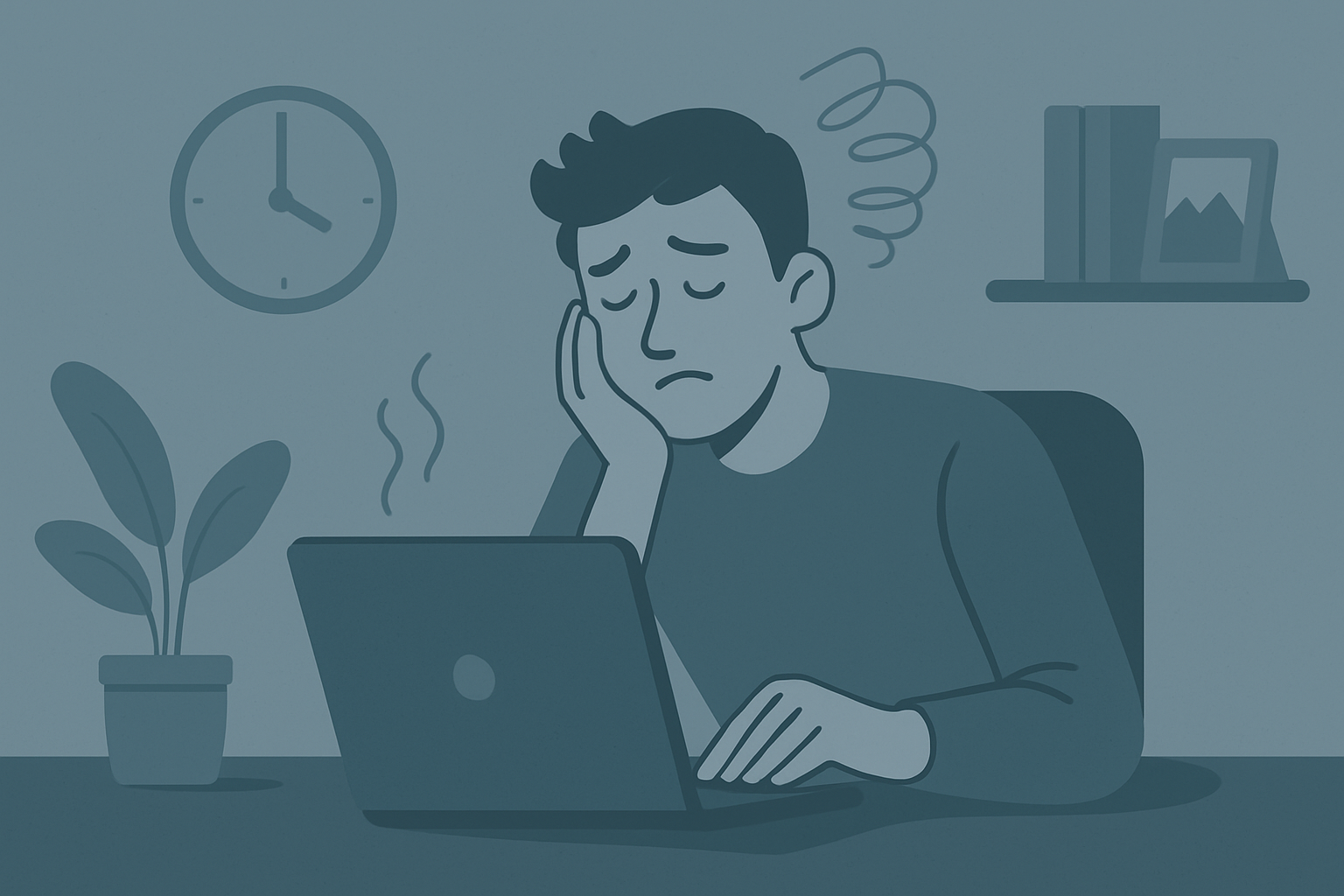How to Stay Motivated and Avoid Burnout While Working From Home

Applying for remote jobs? Learn how to craft a work-from-home resume that grabs attention, highlights remote skills,...
.jpeg](https://jobpe-assets.s3.us-east-1.amazonaws.com/blogs/ChatGPTImageJul3202504_01_10A%20%281%29.jpeg)
Don't have a degree? Discover in-demand work-from-home jobs that value skills over qualifications. Learn how to...

Discover easy, flexible part-time remote jobs ideal for students, freshers, and job seekers looking to earn from...

Learn actionable tips to maintain motivation and prevent burnout while working remotely. Build habits that support...

Confused between freelancing and remote work? Learn the key differences, pros, cons, and how to choose what suits your goals.

Build a focused and ergonomic work-from-home setup with practical tips on space, tools, and distraction-free...

Prepare for your remote job interview with common work-from-home questions and clear example answers to stand out...

Discover beginner-friendly remote jobs ideal for students and freshers, including customer support, content writing,...

Learn the essential skills to succeed in remote jobs—from time management to communication and digital collaboration tools.

Avoid remote job scams with this guide to spotting fake listings and finding safe, legitimate work-from-home jobs...
Resources
-

Set up personalized job alerts to receive notifications about new job openings that match your...
-

Find part-time job opportunities perfect for students, parents, and professionals seeking...
-

Work from home jobs across industries with flexible hours, competitive pay, and real career...
-

Create professional resumes with easy-to-use resume builders. Choose from templates, get...
-

Kickstart your career with internships tailored for students and graduates — explore paid,...
-

Remote jobs have revolutionized how we work, giving professionals the freedom to contribute from...
-

Find the best fresher jobs and entry-level opportunities across IT, Finance, Marketing, and...

How to Stay Motivated and Avoid Burnout While Working From Home
Working from home sounds great, until the distractions, fatigue, and blurred boundaries start piling up.
At first, it feels like freedom. No long commute. More time with family. A flexible schedule. But after a while, it’s easy to feel disconnected, unproductive, or even exhausted by the lack of routine.
Whether you’re a full-time remote worker, freelancer, or juggling part-time online gigs, motivation can dip, and burnout can creep in.
This guide helps you stay focused, feel better, and actually enjoy working from home. We’ll break down how to build better habits, fix common mistakes, and protect your energy, so remote work stays sustainable, not stressful.
Why Motivation Drops in Remote Work
You’re not lazy. The drop in energy or drive is often due to common remote work challenges:
- No physical separation between work and rest
- Fewer spontaneous interactions with coworkers
- Lack of structured routine or accountability
- More screen time, less movement
- Pressure to always be “on”
These problems sneak in quietly, especially when you’ve been working from home for months without adjusting your habits.
How to Stay Focused Without Burning Out
Let’s break it down. Motivation is not something you wait for. It’s something you support by making small, smart changes.
1. Create a Consistent Morning Routine
Your brain needs a cue that the workday is starting.
- Wake up at the same time each weekday
- Get dressed—even if it's just casual clothes
- Spend 10–15 minutes doing something non-digital: stretch, read, journal, or sit with coffee
Avoid rolling straight from bed into email. It sets a reactive tone for your entire day.
2. Set Physical Boundaries (Even in a Small Space)
You don’t need a full home office. But you need some separation between “work mode” and “rest mode.”
- Pick a spot in your home where work happens, like a desk, table, or even a corner with a chair
- Avoid working from bed unless absolutely necessary
- Put away your laptop at the end of the workday
This physical cue helps your mind switch off when work is done.
Preventing Burnout Before It Starts
Burnout often builds up quietly. It's not just about working too many hours, it’s about not getting enough recovery.
3. Take Real Breaks
Not scrolling breaks. Not snack breaks. Actual movement or rest.
- Step outside for 5 minutes
- Do a short breathing or stretching exercise
- Use a Pomodoro timer (25 mins work / 5 mins break)
- Block 30 minutes for lunch away from screens
Breaks keep your brain fresh. No one can focus for 6 hours straight.
4. Watch for “Always-On” Thinking
It’s easy to blur work and personal time when your laptop is always nearby.
- Set a work shutdown time each day (example: 6:00 PM)
- Turn off Slack or email notifications after hours
- Communicate your availability clearly with your team
You don’t need to respond instantly. Being available all the time leads to exhaustion.
Build Better Motivation Habits Over Time
Motivation doesn’t just show up. It grows when you feel capable, connected, and in control.
5. Use Small Daily Goals
Big goals feel overwhelming. Focus on progress, not perfection.
- Start each day by listing 2–3 key tasks
- Block time on your calendar for deep focus
- End your day by checking off what you did (yes, that counts)
Tiny wins build momentum.
6. Add Variety to Your Week
Doing the same thing, in the same way, every day wears you down.
- Switch up your background music or playlists
- Alternate deep work and admin tasks
- Join virtual events, team huddles, or co-working calls
- Work from a café or library once a week if possible
Novelty helps refresh your brain without needing a vacation.
What to Do When You're Already Feeling Burnt Out
Burnout isn’t fixed with a to-do list. If you’re deep in it, slow down first.
7. Acknowledge the Burnout
You’re not weak for feeling tired. You’ve been operating without clear boundaries or support.
- Pause big side projects if needed
- Speak with your manager about adjusting the workload
- Shorten meetings or work in blocks that feel manageable
The goal is recovery, not punishment.
8. Reconnect with Purpose
Why are you doing this job in the first place? Sometimes you lose sight of it.
- Write down one thing this job helps you do (e.g., support your family, save for school)
- Think about skills you're building that connect to your long-term goals
- If the work truly feels disconnected, it may be time to shift roles or talk to a mentor
Clarity fuels motivation.
Use the Right Tools to Stay On Track
You don’t need to do it all alone. There are simple tools that can support better habits.
- Use a productivity tracker to build a daily structure for remote roles
- Use an Auto Apply tool to find better remote gigs without job search fatigue
- Build confidence without the anxiety spiral with Interview Practice
Stay consistent—not perfect.
Watch for These Motivation Killers
Some habits quietly drain your energy without you noticing.
- Always multitasking – Focus jumps create mental fatigue
- Working late every night – Your brain never fully powers down
- Never celebrating wins – Even small milestones deserve recognition
- Saying yes to everything – Learn to protect your bandwidth
Catch these early so they don’t pile up.
When to Seek Support
Sometimes, motivation dips go deeper.
Reach out if:
- You feel low every day, even after rest
- Work anxiety is affecting sleep or relationships
- You feel isolated or disconnected from others
- You’ve lost interest in things you used to enjoy
Speak to a trusted friend, mentor, or therapist. There’s nothing weak about asking for help. Remote work doesn’t have to mean going it alone.
Create a Weekly Recharge Plan
It’s not about grand gestures. Just build a rhythm that helps you refuel regularly.
Try this basic weekly formula:
- 1 movement break daily – 10 mins of walking, stretching, or standing
- 1 offline hobby session – Art, cooking, sports—anything not on a screen
- 1 non-work chat – Call a friend or join an online community
- 1 mini reward – A movie night, snack, or treat after a tough day
- 1 reset ritual – Sunday planning or reflection, even 15 minutes
You don’t have to wait for burnout to start recovering.
Long-Term Tips for Sustainable Remote Work
As remote work becomes your norm, these habits make the lifestyle healthier and more fulfilling.
- Review your boundaries monthly and adjust as needed
- Refresh your workspace every quarter
- Keep learning new tools or skills so work feels exciting
- Mix solo focus time with occasional collaboration
- Talk to peers regularly—community matters
The better your habits, the easier motivation becomes.
Let Remote Work Work For You
Working from home is not just about flexibility. It’s about learning to manage your energy, space, and mind in a way that supports your goals.
Motivation is a skill, not a feeling. Burnout is a signal, not a failure.
With the right habits, tools, and mindset, you can stay productive without losing peace of mind.
Looking for better remote jobs with structure, support, and growth potential? Start with curated roles on JobPe and build your career from anywhere.
